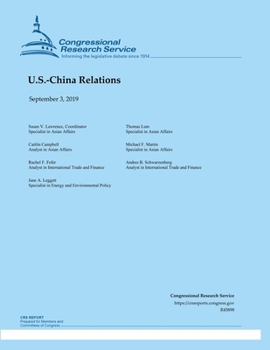U.S.-China Relations
The United States and the People's Republic of China (PRC or China) are involved in a prolonged stand-off over trade and in competition that is spilling from political and military areas into a growing number of other spheres, including technology, finance, and education, severely straining ties on the 40th anniversary of the two countries' establishment of diplomatic relations. The two lead the world in the size of their economies, their defense budgets, and their global greenhouse gas emissions. Both countries are permanent members of the United Nations (U.N.) Security Council. In 2018, they were each other's largest trading partners. During the Trump Administration, competition has dominated the relationship and areas of cooperation have shrunk. The 2017 National Security Strategy (NSS) describes both China and Russia as seeking to "challenge American power, influence, and interests, attempting to erode American security and prosperity." To pressure China to change its economic practices, the United States has imposed tariffs on hundreds of billions of dollars of U.S. imports from China, with almost all imports from China scheduled to be subject to additional tariffs by December 15, 2019. U.S. tariffs and China's retaliatory tariffs have reordered global supply chains and hit U.S. farmers and manufacturers particularly hard. Twelve rounds of negotiations have not resolved the dispute. On August 5, 2019, the U.S. Treasury Department labeled China a currency manipulator for the first time in a quarter century. The Administration has placed restrictions on the ability of U.S. firms to supply PRC telecommunications giant Huawei. The United States has also sought to warn other nations away from business dealings with Huawei and from cooperation with China on infrastructure projects under the framework of China's Belt and Road Initiative (BRI). Many analysts ascribe the rising friction in the relationship today not only to the arguably more confrontational inclinations of the Trump Administration, but also to more assertive behavior by China under President Xi Jinping. Xi assumed the top posts in the Communist Party of China in November 2012 and added the state presidency in March 2013. Later in 2013, China began building military outposts in the South China Sea and Xi launched BRI, an ambitious effort to boost economic connectivity-and China's influence-across the globe. In 2015, China began enacting a suite of national security legislation that shrank the space for independent thought and civil society, subjected ordinary citizens to stepped-up surveillance, and imposed onerous conditions on foreign firms operating in China. The same year, China launched its "Made in China 2025" plan, seeking to reduce China's reliance on foreign technology and directing the considerable resources of the state toward supporting the development of "national champion" Chinese firms in 10 strategic industries. In 2017, at the end of his first five-year term in his Party posts, Xi tasked China's military with turning itself into a "world-class" force by mid-century. Also in 2017, his government began forcing more than 1 million of his Turkic Muslim fellow citizens in the northwest region of Xinjiang into reeducation camps.
Format:Paperback
Language:English
ISBN:169320777X
ISBN13:9781693207778
Release Date:January 1
Publisher:Independently Published
Length:64 Pages
Weight:0.38 lbs.
Dimensions:0.1" x 8.5" x 11.0"
Customer Reviews
0 rating





